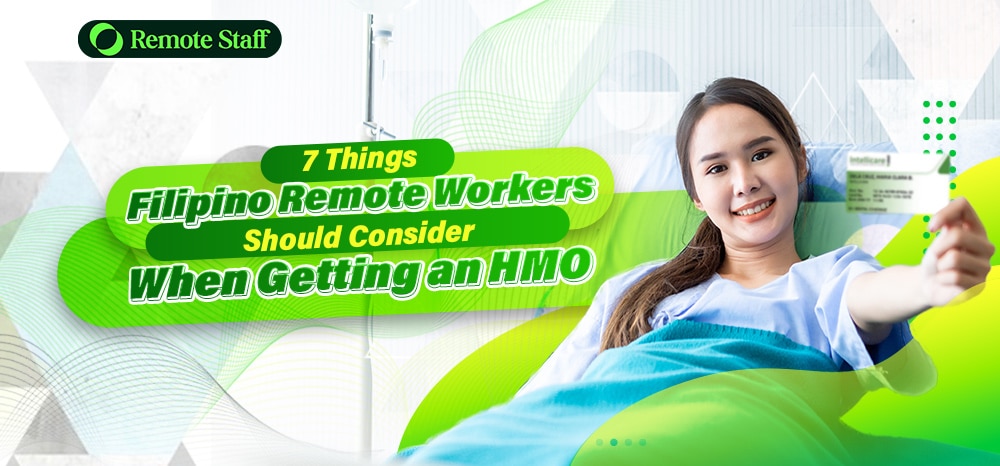Most people are one big hospitalization away from financial ruin.
Moreover, even if you can afford it, you wouldn’t want to spend all your savings on treatments.
That’s why health insurance is essential to protect your finances – especially for remote workers. However, not all companies and clients provide free health insurance.
So to safeguard your money from medical emergencies, it’s best to get your own HMO.
The question is, how do you find the best deals for you and your budget?
Here are 7 things to consider when availing an HMO.
Amount of Coverage
First, check the amount of coverage.
There is no ideal amount, but generally, you should choose a plan amounting to at least 50% of your annual income.
This ensures you have decent medical coverage without overspending on yearly premiums.
Also, insurance agents recommend enough coverage for a coronary artery bypass graft because heart attacks rank as the top global cause of death.
That’s estimated to be around Php 400,000 to Php 1,100,000.
However, you can avail of a higher amount if it gives you more peace of mind.
Coverage for Pre-existing Conditions
Not all HMOs insure pre-existing conditions like chronic, cardiovascular, autoimmune, and mental health diseases.
If you have pre-existing conditions, you should check if the HMO covers these too.
Partner Hospitals
Most HMOs partner with a large network of hospitals around the Philippines.
If you avail of an HMO with international coverage, it can even cover medical expenses when you’re abroad.
Basically, your insurance is only valid with the hospitals the HMO is affiliated with.
If you’re staying near central business districts, a cheaper HMO with limited partner hospitals might be enough.
However, if you want more area coverage, you can choose HMOs with a wider network of hospitals.
Some companies even cover treatments in all hospitals and doctor’s consultations in the Philippines, but these come with a higher annual premium.
Coverage for Outpatient Care vs Inpatient Care
Next, you should understand the difference between outpatient and inpatient care.
Outpatient care refers to medical services that don’t require hospitalization.
These include routine check-ups, diagnostic tests (like blood tests or X-rays), minor surgeries, consultations with specialists, and physical therapy or counseling.
On the other hand, inpatient care involves treatment that requires hospital admission for at least one night.
It includes major surgeries, treatments for severe illnesses or injuries, intensive care, and procedures that require constant monitoring.
Most cheaper HMOs provide higher coverage for inpatient care, but very limited benefits for outpatient procedures.
So verify the treatments covered by your HMO coverage when you avail.
If your budget permits, choose one with ample outpatient care coverage.
Prescription Drug Coverage
How about prescription drugs? Fortunately, some HMOs also cover these.
This typically includes drugs prescribed by a doctor and dispensed by a pharmacy.
Some HMOs may also cover generic versions of certain drugs. It is important to read the terms and conditions of the plan carefully to determine what the HMO can reimburse.
Dental Coverage
Basic HMOs typically do not include dental coverage.
You will need to purchase a separate dental plan or an add-on if you want coverage for dental services. (Add-ons can cost roughly Php 1,500 to Php 2,500.)
However, it’s worth it, especially for emergencies like a root canal treatment which costs Php 6,000 per canal (one molar has three canals).
Additional Perks
Most HMOs have additional perks aside from medical coverage.
They have free wellness programs (e.g. gym membership, annual check-ups, free wellness classes, etc.), telemedicine services, and discount perks on partner establishments.
One HMO even covers travel insurance when you avail of their package.
So make sure to check the additional benefits that fit your lifestyle.
This way, you can protect your health and your finances even while working remotely.
However, if you’re still looking for an online job, you can sign up with Remote Staff for the best remote working opportunities for Filipinos.
A lot of our clients offer healthcare benefits – even if it’s not mandatory.
These can be a nifty addition to your current HMO, protecting your health while you further establish your remote working career.
Register today!








